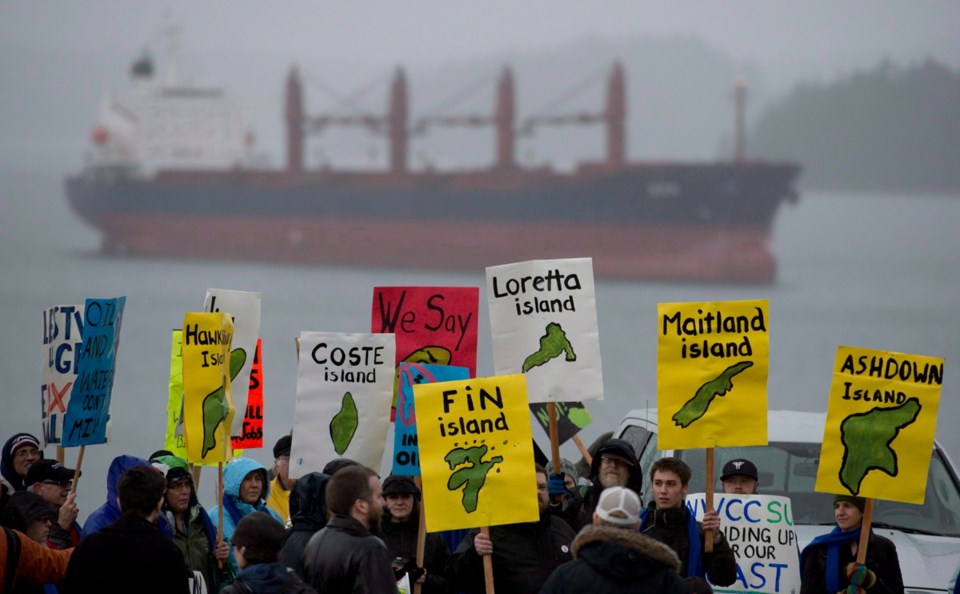 To paraphrase Sir Winston Churchill, this is not the end of the pipeline debate, nor even the beginning of the end. Now buckle down for a civil war.
To paraphrase Sir Winston Churchill, this is not the end of the pipeline debate, nor even the beginning of the end. Now buckle down for a civil war.
The joint review panel vetting Enbridge’s Northern Gateway proposal did the expected Thursday, giving the project conditional approval.
Don’t bet on the pipelines ever being built, though, at least not any time soon. As determined as Stephen Harper, Alberta, China and the oil industry are to see the $8-billion project go ahead, it would be a huge challenge to ram the pipelines through without British Columbians’ approval — and we are conflicted.
This is the reality the proponents don’t seem to understand: The opposition — or at least the wariness — is broader than portrayed.
It’s that disconnect, the difference in the way the story is told, that is telling. Back in 1945, Hugh MacLennan’s seminal novel, Two Solitudes, spoke to the gulf between French and English Canada. Today, someone could write a book about the cultural gap between Calgary and the coast.
From the Alberta perspective, there’s a bottleneck — or a pipeline-neck — that prevents the sale of more oil to the U.S., where the Keystone pipeline proposal has been blocked. The industry could diversify its markets and get a better price piping oil to B.C. for shipment to Asia, where there are refineries that could handle the Alberta bitumen.
Alas, the narrative goes, the path to prosperity is being blocked in B.C. by a noisy minority of woolly headed anti-development, anti-oil hippies and marginalized/angry aboriginals who need to be placated/bought off, along with a provincial government that’s holding out for a bigger slice of the petro-pie. This version makes it sound as though the fight is about ideology and greed.
Here in B.C. — at least on the coast — the tale is told differently, and it has little to do with wanting more money or being anti-industry or anti-oil; most of us drive cars and know we need to get the fuel from somewhere. Nor is the story about global warming, or whether or not the oilsands are dirty, or even about the pipelines themselves. It’s about what happens to the oil after it hits salt water.
Simply put, people fear that adding 220 supertankers a year to the snotty waters of B.C.’s inner coast would be rolling the dice on another Exxon Valdez. (Note that a technical report prepared for the province this year concluded the open-water recovery of spilled oil would be impossible in waves of two metres or higher; on Thursday, just as the Northern Gateway recommendations were being released, the waves in Hecate Strait hit 2.7.)
The opposition isn’t just limited to tree huggers, but to the likes of the Union of B.C. Municipalities and the provincial government, which, in May, drew up a 50-page document detailing its reasons for rejecting Northern Gateway.
The federal cabinet has six months to approve Enbridge’s proposal, which it almost certainly will. The Conservatives have been putting the building blocks in place, removing regulatory hurdles and, according to the Green party, spending $78 million this year alone on supports for a pipeline project Ottawa has yet to approve. (Note that on Monday, the feds quietly announced that the National Energy Board, not the Department of Fisheries and Oceans, would decide whether pipelines harm fish habitat.)
But before the Conservatives can bless the proposal they have to consult First Nations, which almost certainly will balk. The battle will go to the courts, where it could be tied up for years.
Also note that neither Enbridge nor the feds have wriggle room when it comes to the 209 conditions attached to the project on Thursday. The government can ask the National Energy Board to review them, but can’t change them unilaterally.
The biggest roadblock remains the provincial government. While Harper might have the legal muscle on his side, B.C. Environment Minister Mary Polak spoke Thursday of how hard it would be to make Northern Gateway work without the “social licence” of the province’s approval. (And the Victoria-based Dogwood Initiative promised Thursday that in the event the B.C. Liberals eventually accede, it will launch a voter initiative — a campaign similar to the one that forced B.C.’s HST referendum.)
This fight has only just started.



